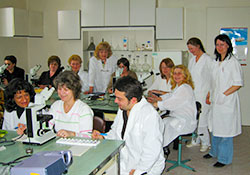Bulgaria: 50 years malaria free

Bulgarian Association of Medical Parasitologists
On 29 May 2015, Bulgaria celebrates 50 years of being malaria free. This is the result of the enormous efforts of several generations of health workers, who first combated malaria and then managed to keep the country free of the disease. The Ministry of Health of Bulgaria, the National Centre of Infectious and Parasitic Diseases and the Bulgarian Society for Parasitology are hosting the anniversary event.
"We would like to express our gratitude to the WHO Regional Office for Europe for their continuous support, consultations and technical assistance", say Professor Todor Kantardjiev, Director of the National Centre of Infectious and Parasitic Diseases, and Professor Rossitza Kurdova-Mintcheva, President of the Bulgarian Society for Parasitology.
Malaria had been endemic in Bulgaria since ancient times. In 1946, the highest number of new cases was registered, with over 144 000 people falling ill with the disease. Two years later, in 1948, the country started its malaria eradication campaign, in line with the WHO eradication programme. It included control of mosquitoes, detection and treatment of malaria cases and mass administration of medicines. The campaign resulted in the elimination of malaria from the country and in July 1965, Bulgaria was certified malaria free by WHO.
50 years of robust action to maintain malaria-free status
Notwithstanding this achievement, the national malaria programme has faced many challenges over the past 50 years in preventing the reintroduction of malaria. Malaria was increasingly imported into Bulgaria by travellers to and from endemic countries, and both the presence of malaria vectors and the favourable conditions for mosquito breeding and propagation increased the risk of renewed malaria transmission. From 1966 to 2014, there were nearly 3000 cases of malaria of all types imported into Bulgaria, resulting in 16 deaths.
This prompted a number of combined actions.
- Public health advice was provided to travellers to countries where malaria was endemic. This was provided by the Department of Parasitology of the 28 regional health inspectorates and outpatient clinics were set up.
- Sustainable solutions for vector control, including the permanent draining of mosquito breeding sites, as well as improved living standards of human habitations, were introduced. Entomological surveillance was continued in areas with a high risk of malaria.
- Epidemiological surveillance of malaria to ensure prompt detection and treatment of patients, as well as a timely response to outbreaks, was carried out. This included the examination of all febrile patients coming from malaria-endemic countries; prompt and radical treatment; case investigation; and rapid laboratory testing.
Eliminating malaria from the WHO European Region by 2015 is a realistic and attainable goal
Over this period, Bulgaria has worked very closely with the WHO Regional Office for Europe. WHO/Europe provided technical assistance and support to the country and shared the experience and expertise from Bulgaria with other malaria-affected countries. Bulgaria's National Centre of Infectious and Parasitic Diseases conducted an external quality assessment and certified several national malaria laboratories.
The WHO European Region aims to interrupt the transmission of malaria and eliminate the disease by 2015 from the remaining affected countries. The number of reported locally acquired cases has dropped dramatically – from more than 90 000 in 1995 to only 2 cases in Tajikistan and 5 introduced cases in Turkey in 2014.
Eliminating malaria from the Region by 2015 is a realistic and attainable goal. Turkmenistan attained malaria-free status in 2010, Armenia in 2011 and Kazakhstan in 2012. Kyrgyzstan has recently initiated the process of certification of malaria elimination. Malaria transmission was interrupted in Azerbaijan, Georgia and Uzbekistan.



